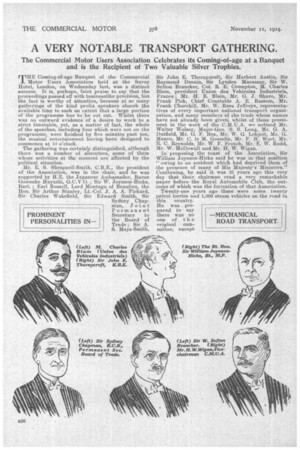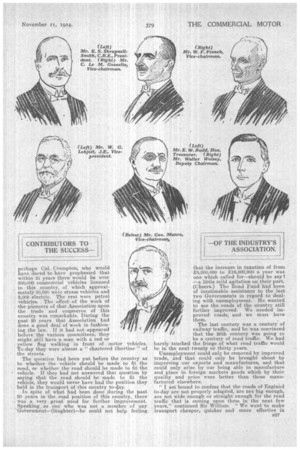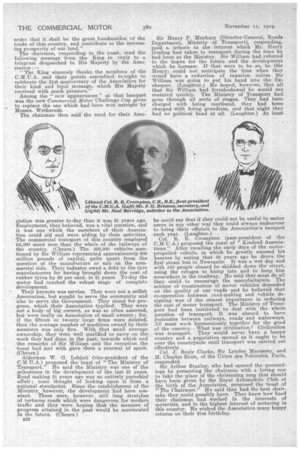A VERY NOTABLE TRANSPORT GATHERING.
Page 10

Page 11

Page 12

If you've noticed an error in this article please click here to report it so we can fix it.
The Commercial Motor Users Association Celebrates its Coming-of-age at a Banquet and is the Recipient of Two Valuable Silver Trophies.
rpnE Coming-of-age Banquet of the Commercial
Motor Users Association. held at the Savoy Hotel, London, on Wednesday last, was a distinct success. It is, perhaps, faint praise to say that the proceedings passed oft with businesslike precision, but the fact is worthy of attention, because at so many gatherings of the kind prolix speakers absorb the available time to such an extent that a large portion of the programme has to be cut out. Whilst there was no outward evidence of a desire to work to a strict timetable, yet, as a matter of fact, the whole of the speeches, including four which were not on the programme, were finished by five minutes past ten, the musical entertainment having been designed to commence at 10 o'clock.
The gathering was certainly distinguished, although there was a number of absentees, some of them whose activities at the moment are affected by the political situation.
Mr. E. S. Shrapnell-Smith, ORE., the president of the Association, was in. the chair, and he was supported by H.E. the Japanese Ambassador, Baron Goinsuke Hayashi, 0.0.V.0. ; Sir W. Joynson-Hicks, Bart. ; Earl Russell, Lord Montagu of Beaulieu, the Hon. iir Arthur Stanley, Lt.-Col. J. A. A. Pickard, Sir Charles Wakefield, Sir Edward Smith, Sir Sydney Chapman, Joint Permanent Secretary to the Board of Trade ; Sir A. S. Mays-Smith,
PROMINENT
PERSONALITIES IN—
Sir John E. Thornyeroft, Sir Herbert Austin, Sir Raymond Dennis, Sir Lyndon Macassey, Sir W. Sefton. Brancker, Col. R. E. Crompton, M. Charles Blum, president Union des Vehicules Industriels, France ; Mr. H. E. Blain, Mr. G. J. Shave, Mr. Frank Pick, Chief Constable A. E. Bassom, Mr. Frank Churchill, Mr. W. Rees Jeffreys, representatives of every important national transport organization, and many members of the trade whose names have not already been given, whilst of those prominent in the work of the C.M.U.A. we noticed Mr. Walter WoIsey, Major-Gen. S. S. Long, Mr. G. A. Duffield, Mr. (4. F. Box, Mr. W. G. Lobjoit, Mr. G. Munro, Mr. C. le M. Gosselin, Mr. F. H. Wort, Mr. R. C. Reynolds, Mr. W. F. French, Mr. E. W. Rudd, Mr. W. McDowall and Mr. H. W. Wigan.
In proposing the toast of the Association, Sir William Joynson-Hicks said he was in that position " owing to an accident which had deprived them of the presence of many of His Majesty's Ministers." Continuing, he said it was 21 years ago this very day that their chairman read a very remarkable paper before the Royal Automobile Club, the outcome of which was the formation of that Association.
• Twenty-one years ago there were some twenty petrol lorries and 1,000 steam vehicles on the road in this, country. He was prepared to say perhaps Col. Crompton, who would have dared to have prophesied that within 21 years there would be over 300,000 commercial vehicles licensed in this country, of which approximately 30,000 were steam vehicles and 2,000 electric. The rest were petrol vehicles. The effect of the work of the pioneers of that Association upon the trade and commerce of this country was remarkable. During the past 20 years that Association had done a good deal of work in fashioning the law. If it had not.appeared before the various committees, they might still have a man with a red or yellow flag walking in front of motor vehicles. To-day they were almost a "chartered libertine" of the streets.
The question had been put before the country as to whether the vehicle should be Made to fit the road, or whether the road should be made to fit the
vehicle. If they had not answered that question by saying that the road shouldbe made to fit the vehicle, they would never have had the position they held in the transport of this country to-day.
• In spite ofwhat had been done during the past 20 years in the road position of this country,, there was a very great need for further improvement. Speaking as one who was not a member of any ‘Government—(laughter)—be could not help feeling that the increase in taxation of from £8,000,000 to £16,000,000 a year was one which called for—should he say? —a little mild agitation on their part. (Cheers.) The Road Fund had been of inestimable assistance to the last two Governments in regard to dealing with unemployment. He, wanted to see the "roads of the country still further improved. We needed improved roads, and we must have them.
The last century was a century of railway traffic, and he was convinced that the 20th century was going to be a century of road traffic. We had barely touched the fringe of what road traffic would be in the next twenty or thirty years.
Unemployment could only be removed by improved trade, and that could only be brought about by improving our exports and manufactures, and that could only arise by our being able to manufacture and place in foreign markets goods which by their quality and price were better than those manufactured elsewhere.
"I am bound to confess that the roads of England .to-day are not properly adapted, are not big enough, are not wide enough or straight enough for the road traffic that is corning upon them in the next few years," continued Sir William. "We want to make transport cheaper, quicker and more effective in order that it shall be the great handmaiden of the trade of this country, and contribute to the increasing prosperity of our land." • The chairman, responding to the toast, read the following message from the King in reply to a telegram despatched to His Majesty by the Association : - "The King sincerely thanks the members of the C.M.U.A. and their guests assembled to-night to celebrate the 21st anniversary of the Association for their kind and loyal message, which His Majesty received with much pleasure."
Among the "new appearances" at that banquet was the new Commercial Motor Challenge Cup given to replace the one which had been won -outright-by Messrs. Wethereds.
The chairman then said the need for their Asso dation was greater to-day than it was 21 years ago. Employment, they believed, was a vital question, and it was one which the members of their Association could aid and were aiding by their activities. The commercial transport of this country employed 64,000 more men than the whole of the railways of the country. (Cheers.) The 300,000 vehicles mentioned by Sir William represented approximately 205 million pounds of capital, quite apart from the question of the manufacture or sale on the commercial side. Their industry owed a debt to the tyre manufacturers for having brought down the cost of rubber tyres by 90 per cent. in 21 years. To-day the motor had reached the robust stage of complete development.
Their keynote was service. They were not a selfish Association, but sought to serve the community and also to serve the Government. They stood for progress, which their Association typified. They were not a body of big owners, as was so often asserted, but were really an Association of small owners • for, if the fifteen or twenty large firms were deleted, then the average number of machines owned by their' members was only five. With that small average ownership, they were well qualified to carry on the work they had done in the past, towards which end the remarks of Sir William and the reception the toast had met with gave them a renewal of spirit. (Cheers.) Alderman W. G. Lolojoit (vice-president of the C.M.U.A.) proposed the toast of The Ministry of Transport." He said the Ministry was one of the milestones in the development of the last 21 years. Road making 21 years ago was an entirely parochial affair ; none thought of looking upon it from a national standpoint. Since the establishment of the Ministry, however, the development had been constant. There were, however, still long stretches of tortuous roads which were dangerous for modern traffic and they were hoping that the measure of progress attained in the past would be accelerated in the future. (Cheers.)
E28 Sir Henry P. Maybury (Director-General, Roads Department, Ministry of Transport), responding, paid a tribute to the interest which Mr. Harry Gosling had taken in transport during the time he had been at the Ministry. Sir William had referred to the hopes for the future and the development which he foresaw. If that were to be so, he (Sir Henry) could not anticipate the time when they would have a reduction of taxation unless Sir William was going to put his hand into the Exchequer. (Laughter.) He hoped, however, that all that Sir William had foreshadowed he would see matured quickly. The Ministry of Transport had gone through all sorts of stages. They had been charged with being moribund, they had been charged with being grandiose, and that night they had no political head at all. (Laughter.) At least he could say that if they could not be useful to motor users in any other way they could always endeavour to bring their officials to the Association's banquet each year. (Laughter.)
Col. R. E. Crompton (past-president of the C.M.U.A.) proposed the toast of " Kindred Associations." After recalling the early days of the motorpropelled vehicle, in which he greatly amused his hearers by saying that 53 years ago he drove the first steam bus in Newcastle. It was a wet day and with 100 people aboard he skidded down the' street, using the refuges to bump into and to keep him somewhere in the roadway. He said they must do all they could to encourage the manufacturers. The science of construction of motor vehicles depended on the quality of our roads and he believed that co-operation between road-making and vehicle designing was of the utmost importance in reducing the cost of motor transport. The Ministry of Transport had been instituted to deal with the whole question of transport. It was absurd to have jealousies between railways, roads and waterways. All must work harmoniously together for the good of the country. What was civilization ? Civilization was transport. They would never have a happy country and a population spread as it ought to be over the countryside until transport was carried out effectively. Col. J. Sealy Clarke, Sir Lynden Macassey, and M. Charles Blum, of the Union des Vehicules, Paris, responded. Sir Arthur Stanley, who had opened the proceedings by presenting the chairman with a loving cup to take the place of the christening mug that should have been given by the Royal Automobile Club at the birth of the Association, proposed the toast of a The Chairman." He said they had the best chairman they could possibly have. They knew how hard their chairman had worked in the interests of motorists, and in the highest interest of motoring in this country. He wished the Association many happy returns on their 21st birthday.






























